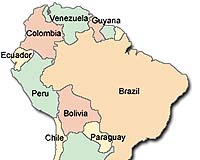| . |  |
. |
Jerusalem (AFP) Sept 24, 2010 Palestinian president Mahmud Abbas rejected an Israeli suggestion on Friday that a compromise on settlement building may be possible ahead of a scheduled moratorium ending that threatens to derail Middle East peace talks. Two days before the conclusion of the 10-month partial moratorium on settlement construction in the occupied West Bank, Israel indicated it was willing to cut a deal acceptable to the United States and the Palestinians, who both want an extension of the restrictions. "Israel is prepared to reach a compromise acceptable to all parties," a senior government official said when asked about US President Barack Obama's call for the moratorium to be extended. But he also stressed that "there cannot be zero construction" in West Bank settlements. Prime Minister Benjamin Netanyahu was "making intensive efforts to reach such a compromise before the expiration of the moratorium on September 26," added the official, asking not to be identified. Israel was previously adamant that the restrictions would not be renewed, even though Abbas had already threatened to walk out of the US-brokered peace talks over the issue. And Abbas on Friday rejected any compromise that does not guarantee a "complete halt" to settlement activity, his adviser Nabil Abu Rudeina told AFP. "A total freeze must be maintained on settlement activity in the Palestinian territories, including in Jerusalem. We reject any partial solution," he said. "Partial solutions do not create a suitable climate for the pursuit of negotiations," Abu Rudeina said of the direct talks with Israel that resumed at the beginning of September after a 20-month break. Arab League chief Amr Mussa, in New York on the sidelines of the UN General Assembly, told reporters Israel must show a readiness to extend the freeze if the peace talks are to continue. Israel must show it is "stopping building settlements," he insisted, adding that "continuing or prolonging or extending the moratorium is a must and is a symbolic message that the Israeli policy is serious about this." Obama on Thursday firmly restated his conviction the moratorium should be extended. Abbas welcomed Obama's remarks, "especially his call for a halt of the settlement activities and for the creation of a Palestinian state." But he also reiterated his threat to quit the talks if new construction curbs are not imposed. "At the end of the freeze period on the 26th of this month, if the response about the freeze of settlement is not positive, we will halt negotiations," Abbas said in New York on Thursday. Israeli settlers accused Obama of caving in to Abbas's threat. "If President Obama wants to be perceived as an honest broker in this process, he should make clear to Mr Abbas and his colleagues that threats, blackmail and preconditions are not acceptable," the Yesha Council, which represents the settlers, said. Washington also said on Thursday it was proposing "ideas" to Israeli and Palestinian negotiators in a bid to break the stalemate. The previous round of direct negotiations collapsed when Israel launched a devastating military offensive on the Hamas-run Gaza Strip in December 2008. Abbas and Netanyahu did not appear to have made any progress towards narrowing their differences during talks last week in Egypt and in Jerusalem attended by Clinton. US officials have suggested a three-month extension to the moratorium, during which time the two sides could agree on borders, which could neutralise the settlements dispute, a senior Palestinian official said. The Palestinians and US negotiators want a complete halt to settlements while Israel is insisting on continuing to build in major blocs it hopes to keep in any final peace accord. Abbas told AFP this week he was "not opposed to a settlement freeze for a month or two." The international community considers Israeli settlements in the West Bank, including annexed east Jerusalem, to be illegal. The settlements issue has long been among the thorniest in the peace process. Some 500,000 Israelis live in more than 120 Jewish settlements across the West Bank and east Jerusalem, territories expected to form the bulk of a future Palestinian state. Israel captured Arab east Jerusalem in 1967, and considers the city its "eternal and indivisible" capital. Another core issue is Palestinian refugees. The Palestinians want Israel to recognise the "right of return" of those who fled or were expelled when the Jewish state was created in 1948. With their descendants, they number 4.7 million people. Israel rejects the demand. burs/srm/afq
Share This Article With Planet Earth
Related Links
 Colombia kills FARC leader, striking blow to rebels
Colombia kills FARC leader, striking blow to rebelsBogota (AFP) Sept 24, 2010 A bold Colombian assault on a rebel camp has killed the military leader of the nation's oldest insurgency in what defense officials are calling the "hardest blow ever" against the leftist guerrillas. Ground troops supported by helicopters and warplanes stormed the fortified camp, killing the feared war commander of the Revolutionary Armed Forces of Colombia (FARC) known as Mono Jojoy, offici ... read more |
|
| The content herein, unless otherwise known to be public domain, are Copyright 1995-2010 - SpaceDaily. AFP and UPI Wire Stories are copyright Agence France-Presse and United Press International. ESA Portal Reports are copyright European Space Agency. All NASA sourced material is public domain. Additional copyrights may apply in whole or part to other bona fide parties. Advertising does not imply endorsement,agreement or approval of any opinions, statements or information provided by SpaceDaily on any Web page published or hosted by SpaceDaily. Privacy Statement |